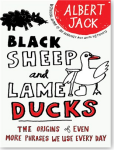

| Book of the Month | ||
 |
Black Sheep and Lame Ducks |  |
Publisher: Penguin
Author: Albert Jack
$13.95
ISBN 978-0399535123
Regular readers of these reviews will know that we have been doing them for a long time now. Back in 2005 in July we reviewed this author's book White Elephants and Red Herrings. The reviewer of that book remarked that this book did not cover all, or even most of the common idiomatic expressions in modern English. Just to prove that this is true, the author has since produced two more books of idioms as well as other books on English such as It's a wonderful Word. Books such as this are useful for students because idiomatic language is widely used in English. I recall a student setting aside a newspaper article and remarking thoughtfully 'I understood every word of that, and absolutely nothing of the meaning'. This review covers Black Sheep, Lame Ducks and hundreds of other idioms. (A 'black sheep' is the most disreputable member of a group; the one who gives the others a bad name. A 'lame duck' used to be an old slow ship, but these days it is used to describe a politician who cannot be re-elected.)
To be precise, there are 2,000 idioms described in this book at the rate of about ten a page (there are 233 pages in the book, but this includes an index of expressions at the back of the book.) An index is needed because the idioms are not arranged alphabetically but in rough categories such as 'At war', 'The working day', 'The ancient world' and so on. We learn that some expressions are actually quite modern - for example the phrase 'In the Doghouse'. This means that a person is in disgrace and someone else is very angry with him. The expression is just over a hundred years old and comes from the 'Peter Pan' works of writer J. M. Barrie, in which someone in disgrace with his wife literally had to live in the doghouse. On the other hand, the phrase 'blowing hot and cold' for someone who cannot make up his mind comes from ancient Greece and is thousands of years old. The expression to 'wear your heart on your sleeve' (meaning to openly show emotion, especially love) comes from in between the other two, in the Middle Ages. We also learn some English history in the process of learning about the expressions. For example, it was once illegal to examine corpses or own a human skeleton. However, doctors found both so essential for their work that many secretly had a 'skeleton in the closet'. Today the idiom is used to describe any embarrassing information or illegal activity we would prefer nobody to know about. So this metaphorical expression was once literal. The book gives the meaning of each expression, the first date that a usage can be found for it, and the origin (etymology) of the idiom. Some of the etymologies may be questionable, because no-one keeps a record of words as they enter English, and thanks to the author's lively style they are at least easily remembered.
Who is this book for? If you learn all these idioms and their origins you may be considered a 'smart aleck', even though the original Aleck was a confidence trickster in New York who was not actually very smart. If you are interested in how words came into the language, or need to learn these expressions as part of learning English, then this book is a fun way to do it. The book is rather expensive, considering that the definition and etymology of most idioms can now be found with a quick request to your internet search engine, but most of these will lack the author's obvious love of English and sheer joy in sharing the results of his work.
Verdict: A fun but expensive way to learn idioms.
Assessment 6/10